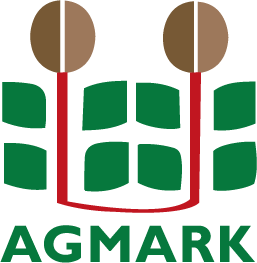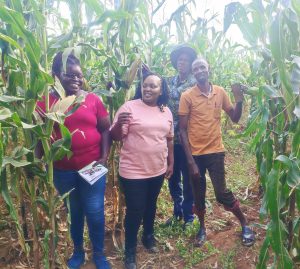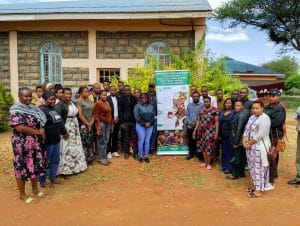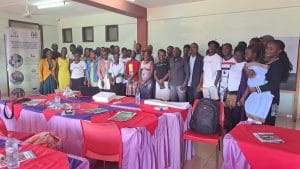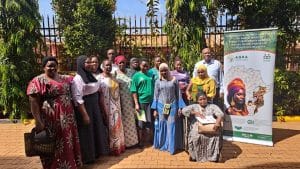At the heart of the buzzing Dar es Salaam trade corridor lies the Nakonde One-Stop Border Post (OSBP), the gateway where Zambia meets Tanzania, and where grain from Zambia and Malawi begins its journey to markets across the world.
AGMARK, in partnership with AGRA, joined forces with the Nakonde Cross-Border Traders Association (CBTA) for a powerful trader capacitation program. Held at Izukanji Lodge, Zambia, the training aimed to sharpen skills in structured grain trade while building real-time linkages with farmer organizations across the region. The training was a continuation of AGMARK’s regional push to equip border communities with the skills and networks they need to compete effectively in East and Southern Africa’s grain trade ecosystem.
AGMARK, in partnership with AGRA, joined forces with the Nakonde Cross-Border Traders Association (CBTA) for a powerful trader capacitation program. Held at Izukanji Lodge, Zambia, the training aimed to sharpen skills in structured grain trade while building real-time linkages with farmer organizations across the region. The training was a continuation of AGMARK’s regional push to equip border communities with the skills and networks they need to compete effectively in East and Southern Africa’s grain trade ecosystem.
AGMARK and Nakonde CBTA Unite
The days leading up to the training were dedicated to mobilizing stakeholders, securing venues, and organizing ground logistics to ensure full participation from local farmers, traders, and cooperatives.
Upon arrival, AGMARK was welcomed by Nakonde CBTA Chairman Mr. Michael Kanyanya, Vice Chair Mrs. Judith, and Youth Leader Mr. Darius. The team facilitated crucial introductions to the Nakonde District Commissioner and the District Intelligence Officer, whose collaboration ensures smooth operations in this strategic trade hub.
The training kicked off from 1-3 July, covering the following key areas:
- Grain Standards & Quality Parameters in the ESA Region – Understanding buyer requirements in structured markets.
- Post-Harvest Management – Preserving grain quality and minimizing losses.
- Negotiation & Contracting – Closing fair deals with traders, processors, and cooperatives.
- Market Intelligence Tools – Using platforms like the COMESA Regional Food Balance Sheet to track trends and opportunities.
- Trade Linkages & Dispute Resolution – Building trust through contracts and understanding resolution pathways.
- Simplified Trade Regime (STR) – Learning how to move goods efficiently and legally across borders for small scale traders.
Participants also benefitted from key policy insights shared by the Zambia Revenue Authority (ZRA) and the Zambia Compulsory Standards Agency (ZCSA), equipping them to navigate customs procedures and meet export quality checks.
As Mr. Maesious Hankanga from the Plant Quarantine and Phytosanitary Department explained, “Standards are not just rules; they are the key to unlocking premium markets.” Mr. Wilson from ZRA reinforced this by walking participants through practical STR applications, helping them avoid costly trade pitfalls.
As Mr. Maesious Hankanga from the Plant Quarantine and Phytosanitary Department explained, “Standards are not just rules; they are the key to unlocking premium markets.” Mr. Wilson from ZRA reinforced this by walking participants through practical STR applications, helping them avoid costly trade pitfalls.
Challenges and Lessons for Future Engagement
As with many cross-border engagements, a few challenges emerged. The current hot and dry Nakonde weather, intensified by heavy truck traffic, created a dusty environment that affected participant comfort. Additionally, some women traders attended with infants, balancing parenting with full participation. Occasional crying and movement caused distractions for other attendees.
Lastly, some participants had limited proficiency in English and could only express themselves effectively in the local language, Bemba.
These moments highlighted both the logistical realities of border towns and the determination of participants to show up and learn despite discomforts. In light of this, it is important to incorporate local language facilitators for multilingual inclusivity in future trainings, as well as considering on-site childcare or flexible arrangements for participants with young children, which is difficult but possible
These moments highlighted both the logistical realities of border towns and the determination of participants to show up and learn despite discomforts. In light of this, it is important to incorporate local language facilitators for multilingual inclusivity in future trainings, as well as considering on-site childcare or flexible arrangements for participants with young children, which is difficult but possible
Looking Ahead
The training in Nakonde was more than just a skills workshop but a stepping stone toward stronger, more connected grain trade networks across the East and Southern Africa (ESA) region. By equipping traders with practical business skills, compliance knowledge, and market intelligence, AGMARK and AGRA are enabling them to compete confidently in structured markets.At Nakonde OSBP, every bag of grain crossing the border now carries not just produce, but also the knowledge, ambition, and resilience of a new generation of cross-border trade leaders. The trucks will keep moving and so will the opportunities for traders.
